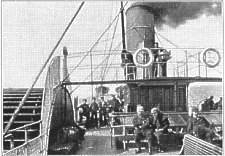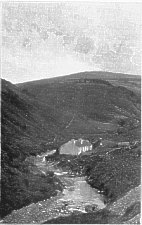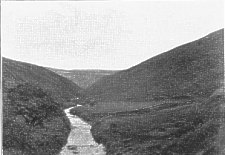
THE ROAD TO ELLAN VANNIN.
[from Harry Druidale, Fisherman ..., 1898]
From near the centre, not unlike a house,
The sloping hills run chiefly north and south.
TAKING into consideration the limited area of the Isle of Man, its streams are of fair size. The principal streams have their source in the mountains about the middle of the island, which culminate in Snaefell, 2034 feet above sea-level. The rain-fall is very heavy among the mountains, and this accounts for the bountiful volume of the streams of Mona as compared with islands of similar area without ranges of mountains.

THE ROAD TO ELLAN VANNIN.
The Sulby river is the largest river in the island. It drains the south and west slopes of Snaefell, the north and west slopes of Beinn-y-Phott (1772 feet), and some adjacent mountains. Between Ramsey and Sulby Bridge, about four miles by the road, the river has a very sinuous course and long stretches of calm water. It then becomes a rapid brawl-ing stream, excellent for both fly and worm fishing. The lower part of the river is good for sea-trout in spring and autumn, and there are also salmon. At Lezayre the river receives an important tributary, Glen Auldyn.
Glen Auldyn is a most beautiful vale. The scenery is sweetly pretty from Ramsey to Sulby Bridge. On the left hand or south side as you proceed from Ramsey, there is a steep range of hills much planted. The low land is also extensively planted. Lezayre Church with its ivy-clad walls, standing amid tall trees, has a most picturesque appearance. A little above Sulby Bridge the vale becomes a narrow glen with very steep sides and occasional plantations, and there are numerous deep pools and cascades. The first deep pool of importance is called the "Bull's Pool," where the deep rocky pools may be said to begin. About four miles up the glen from Sulby there is a waterfall in a tributary stream called Thol-ty-Wull, the neighbourhood of which is much planted and has been made into a pleasure resort. In the season a good luncheon or dinner can be obtained there, washed down by anything from beer to champagne. . The higher portions of the river are described in Chapter IV.
I have fished in the Sulby from time to time since 1859, and the sport has generally been good. I used to walls from the village of Onchan to about the neighbourhood of Thol-ty-Wull, about eight miles, and also walk back in the evening; it was a tiring day and no mistake. I well remember being lost with a friend on the mountains, on a return from a fishing excursion. It was in the month of September. My old friend Ambrose and I started from Onchan about five o'clock in the morning. It was a lovely morning and we much enjoyed the walk by Keppel Gate, which may be said to be the gate of the mountainous region ; thence there is heather, varied by bent and rushes. A mile or so forward there are four lane-ends, the one straight on leading to Snaefell, the one to the right to Laxey, and the one to the left to Druidale. We always enjoyed the walk to the fishing ground when we were fresh, and full of anticipation; the return was different, when we were jaded and longed for the rest of home.
We reached the river about eight o'clock, and parted for the day, as was our wont, and arranged to meet at the junction of the Snaefell stream with the main stream at six o'clock--our fishing days were long when we were young. Our sport was good, and we both had good panniers of trout to carry home. At six o'clock we met, and a difference of opinion arose as to our best way home. I insisted that the shortest way was to cross the foot of Beinn-y-Phott, and thus make direct for the four lane-ends. My friend insisted that the safer way was to make for the Snaefell road above us on the left, although it was an extremely steep ascent. As I was the more stupid of the two I prevailed, and we started. I had forgotten the gullies which serrate the slopes of Beinn-y-Phott, which we had to clamber down and up.
Darkness came on, and there was a thick haze which nearly amounted to a fog. We floundered in bogs often up to our knees, and we were lost. How we got to the four lane-ends I do not know, but we did get there, and when we got there we had no idea which was the right road to take. After much discussion we in the end took the wrong one. On and on we wandered, and we heard a dog bark; we followed the direction and came to a cottage, and we were informed that we were at the head of Laxey Glen, and that our best course was to proceed by way of Laxey, Laxey being six miles from Onchan. Between Laxey and Onchan we often had to sit down to rest by the roadside, and I twice fell asleep, and Ambrose had to awake me. In the end we reached Onchan at two o'clock in the morning, after being practically on our legs for about twenty-one hours-the most tiring day that I ever had in the whole course of my life — but we stuck to our precious trout.
As I only commenced to keep a regular fishing diary in the year 1878, I have not a complete record of the trout I captured before that date; but since and including that year, I have fished in the Sulby river on twenty-one days and captured 487 trout, but on at least eight of the days I only fished for a few hours. The largest number captured in one day was fifty, and then I began fishing at seven o'clock in the morning and wound up at a quarter to one. It may be said that trout in the Manx streams take worm well during the whole of the fishing season; the same cannot be said with regard to the fly, but they frequently take fly very freely. The stone-fly does not exist in the Manx streams, neither does the May-fly. There are not any minnows or loathes ; there are sticklebacks and miller's-thumbs. Eels are numerous. There are no other freshwater fish except those I have named. There are the migratory salmonidæ. There are no water-ousels, so familiar on our English rivers; sandpipers are numerous in summer. It is more easy to capture a good basket of trout with the worm than with the fly, as the river, speaking generally-, and especially when low, is more adapted for the worm up stream. Nevertheless, out of the 487 trout 208 were killed with fly, and generally in low water.
About the year 1884 the Manx Legislature passed an Act of Tynwald for the preservation of the insular freshwater fisheries. A Board of Conservators was appointed, and it became necessary to take out a licence to fish in the rivers of Man. This Act V gave great umbrage to many of the farmers, who banded together and resolved that no person who had provided himself with a licence should be allowed to fish. Therefore the unhappy angler found himself in a dilemma; if he did not procure a licence he might be prosecuted, and if he had procured a licence he might be prosecuted for trespass.
On the 7th of September 1887, I had an experience of the temper of the worthy farmers. I arrived at Sulby Bridge about ten o'clock, having decided to commence operations in a pool in which I had killed an exceptionally fine trout the previous year. The day I refer to was the 19th of June 1886. Immediately below Sulby Bridge there is a rather long pool, made by a weir across the river; one side is fringed with willows, the other side is low. There was a strong wind blowing down the river. I was fishing with a horsehair cast, my tail fly being a small black spider. I cast close to the weir, against which wavelets were breaking. I felt something heavy, and found I was into the monarch of the pool.

SULBY GLEN AND SNAEFELL.
A few yards below was the mill-race, and if he should race down there, there would be a smash, so I pulled him gently up and he came up. He made a desperate rush towards the willows, so I was compelled to pull hard; the run was checked and he sprang high out of the water, and I then saw what a fine fish he was. After some more wild rushes in the direction of the willows, I in the end stranded him on a gravel bed which might have been made for the purpose (I had not a landing net), and secured my prize, a trout of seventeen ounces in prime condition. I have not caught such a fine trout in Man since, and very likely never shall again. He had taken the black spider.
With recollections of this fish I had just begun to fish the pool in expectation or hopes of something good, when I heard a voice behind, which turned out to be that of Mr. Curphey, farmer and miller.
"Who gave you leave to fish here? "
I turned round and beheld a strong opposing force-a man and two youths armed with sticks, supported by two sheep-dogs-and replied mildly, "I did not know the river was preserved."
"I allow no one to fish here; it is my property," he replied.
"I have often fished here before, and never been stopped." "It does not matter, I'll not allow you to fish here."
"Do you fish yourself?" I asked.
"No, I don't; I never handled a rod in my life."
"If you kept the fishing for yourself or your friends, there would be some reason in it. But surely I may fish; I've come from the middle of Yorkshire; my fishing can do you no harm."
"The fact is this," he said; "when you get the trout licence abolished you may fish as hard as you like, but until then no one shall fish."
"It is not my fault that your House of Keys made the law; surely I am not responsible for their Acts ; I would rather not pay for a licence. However, I suppose I can go down the river; how far does your land extend? "
There is no use in going down the river, as the next farmer will turn you off if he sees you."
" Well, I must go up, then."
And up I went, and had a mixed day with fly and worm, with which I killed thirty-six trout. Sometimes I confined myself to fly, and my best day with fly alone was thirty-six trout on the 2nd of June 1881.
Between nine and ten o'clock I wended my way from the railway station through the village of Sulby, hemmed in by hills to the south, and proceeded to an old mill, formerly occupied as a starch-mill. Where the mill-stream enters the river there is a splendid pool, shaded on one side by trees, under which the water runs in a smooth glide, just the place for feeding fish to lie awaiting the fly. My cast was a hair one ; tail fly, black spider; dropper, orange partridge. I cast right under the trees in the gliding water, and was soon fast into a good fish, and a lively one he was, in the air, and up and down the pool. He might have been a pounder. At last I get him on to a gravel bed, and take him out with my hands, a beauty of half a pound. I account for several more fish in the same pool, but only half the size of the first fish. I then fish up some rapid streams, overhung with trees, and account for some more fish, and on up the lovely glen I wander catching a fish here and there. The weather was bright, and a nice north wind blowing up stream; it was a pleasure to be out on such a day, and admire the ferns and moss growing on the rocks.

SULBY GLEN.
But four o'clock comes and we are a good two miles from the station, so we wind up for the day and count our spoils-thirty-six lovely little Manx trout. What a monster the half-pounder looks amongst them all! We hard returned about the same number to the water. We wend our way to the Sulby Glen Hotel and get a refreshing tea. The landlord yarns about the huge baskets of trout captured by a wandering Scotch angler, who fished for the wee Manx trout with a rod eighteen feet long, and we are off to the station and catch the train for Douglas. Having described a day with the respectable fly in the Sulby river, we will condescend to the miserable worm.
It was the Jubilee month of June 1887, the Jubilee of Her Most Gracious Majesty Queen Victoria. My friend Robert and I decided to have a jubilee amongst the trout in the Sulby river, so we arrived at that most comfortable inn the Sulby Glen Hotel on the evening of Monday the 20th of June. We fished with fly in the evening, but for some reason only the wee anes would rise. We rose on the morrow-our Jubilee day-betimes. I despatched Robert about a mile up the river above the place where I intended to commence operations. I commenced in the run above the farthest dam up the river, about a mile from the hotel, at seven o'clock. The weather was intensely hot and cloudless, water dead low. For the first hour the trout came slowly, but after that time well, and trout after trout found their way into my creel. Up and up I fished, often between high rocks with ferns in their crevices, and under dense foliage. How delightful the cool shade amid the dripping rocks after the hot sun ! In one beautiful spot especially, a high rock, bedecked here and there with mosses and ferns, quite overhung the stream, and in the dark pool underneath a good trout came to the creel-rather dark though, as trout caught in such places always are. As I emerge from this chasm-like spot, I am dazzled by the glaring sun. How beautiful the gorse looks, a mass of golden yellow ! After another chasm-like place, into which a cascade falls, I arrive at Thol-ty-Wull. I am tired and hot. It is a quarter to one o'clock. I turn out my spoils and count exactly fifty trout, my Jubilee day. I stroll into the pleasure grounds, and regale myself with cold lamb, washed down by a bottle of claret. Oh, what do the Manx fairies think of claret in the heart of Sulby Glen ? Alas, where are the fairies now? While enjoying a smoke under the shady trees, Robert appeared on the scene with a creel of forty trout, and we compared our spoils. Ten of mine were plump herring-sized fish, not bad for little Mona. Robert also had some nice fish. Soon we drive in our landlord's pony-phaeton to the hotel. A cup of tea, and we consign ourselves to the Manx train; for some distance of our journey the mountains of Man on our left, and the deep blue sea low down on our right. At St. Johns we change for Douglas, and Tynwald Hill is soon left far behind. We pass under the wooded rocks of Greeba, and Douglas is soon reached; and so our Jubilee fishing day ended, one of those pleasant days that always linger fondly in our memory.
|
|
||
|
|
||
|
Any comments, errors or omissions gratefully received
The Editor |
||